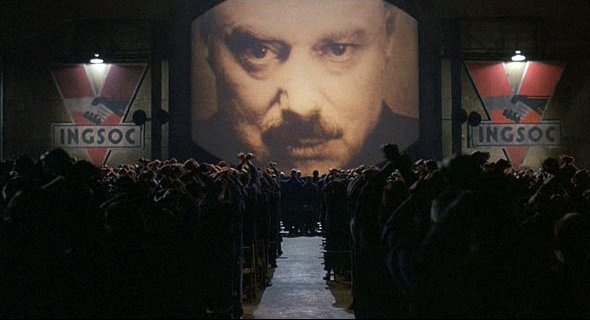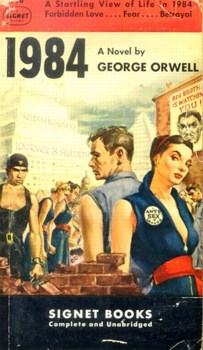I’ve never actually read “1984” myself, but by scouring Twitter I was able to piece this together. So please enjoy what I assume is the classic novel “1984.”

It was a really bad time. The place? America. The year? 1984. Everything was, like, very bad. Only one man dared to defy the establishment. His name was Orwell. Orwell Jones. And this is his really dark story about how bad things can get in America. Yes, that’s right, the very same America you live in. You see, in 1984, free thought was banned – and Orwell had learned that lesson the hard way.
It all started when Orwell was walking down the scary streets of 1984. He was about to open up Twitter and tweet about whatever came into his mind, and also the address, phone number, and Social Security number of a congressman he didn’t like. That’s when he saw them. The Thought Police. Generally speaking, Orwell loved the police and supported law and order. But, in this case, they were bad police, because he was the one who was in trouble.
Oh no, Thought Police, he thought.
“We heard that!” they shouted. “You’re under arrest for doing freedom!”
“You can’t do that! Isn’t this America?”
“Not anymore. Haven’t you heard? It’s 1984!”
Then they locked him up in Thought Prison, by taking away his Twitter. He tried going on Pinterest, but they banned him there, too. He was in a literal, metaphorical prison with no way out. There was only one way out. He went to the busiest street he could find and started yelling.
“People of 1984! They took away my Twitter!”
“Use Pinterest!” someone in the crowd called out.
“I can’t,” Orwell replied. “They took that, too.”
The crowd went silent. He could see the horror on the people’s faces. Someone finally said, “That’s so Kafkaesque. What I mean by that is the same thing happened to my friend, Kafka Richardson.”
“Where’s your friend now?” Orwell asked.
“I don’t know. He can’t use Twitter to tweet what he’s up to.”
Orwell had never been so scared. He’d thought that this was America, where people like him could do whatever they wanted, so long as they referred to themselves as patriots in online forums. He knew that he had to fight back.
“We have to fight back,” he declared to the crowd. “I can no longer tweet, but you can! They can’t stop all of us. If you tweet about how Orwellian and Kafkaesque this whole thing is, then maybe, together, we can defeat 1984!”
Everyone cheered for him, because he was the hero.
“Not so fast!” It was the Thought Police again. “What do you think this is? 1983? No! This is 1984! Everything’s really bad specifically for you and only you and no one else. You can’t stop us!”
Orwell threw a chair into a giant TV [or so I recall from the bit of the movie version that I saw, or maybe it was an Apple commercial]. The Thought Police were in shock. Orwell used the distraction that he’d created to run away as fast as he could. He ran into an alley and was met by three strangers.
“Orwell. We heard of your plight. We are here to help. My name is Kafka Richardson, and these are my friends Bradbury Miller and Atwood Smith. We have all been banned from Twitter, and two of us from Pinterest as well. Together, we can stop 1984.”
“O.K.,” Orwell replied. “But I’m still the hero of this story.”
They talked among themselves for a bit, and then turned back to him. “No deal. I am the hero of this story,” Kafka said.
“Um, no, I am,” Atwood countered.

It’s HERE
At that, they all started bickering. Suddenly, the Thought Police arrived. Their leader spoke: “Well, well, well, what do we have here? A ragtag team of main characters. Get ready to be censored, 1984-style.”
“Wait!” Orwell said, passionately, like a main character. “Don’t you see? This is all bad! Now is the time to come together. For the sake of the country, we have to be united. And by ‘united’ I mean that I get my Twitter back and you can never say anything bad about me ever again. Together, we can do this.”
Everyone stared at him. His speech was so impassioned that he changed their hearts and minds. They dropped their batons and kneeled down.
“You’re right. How could we have been so wrong? You can have Twitter back.”
“Thank you,” Orwell said. Then he looked at the camera and shouted, “I now declare this year to be 1985!”
Everyone cheered.
THE END
(Maybe in more ways than one! ~ Ed.)
Written by Ellis Rosen for The New Yorker ~ January 23, 2021
